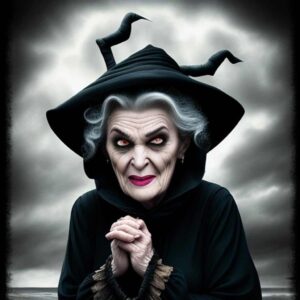The Mischievous Adventures Of Karakondžula
9th July 2023
Categorized Under: 04 characters, Playscripts
Comments Off on The Mischievous Adventures Of Karakondžula
Karakondžula is a creature from Slavic mythology, specifically found in Serbian folklore. It is often described as a fearsome and monstrous creature, resembling a hunchbacked old woman or a witch.
According to the myth, Karakondžula is said to come out at night, particularly during stormy weather or on dark moonless nights. It is believed to have the ability to shape-shift into various forms, making it difficult to identify or escape from its presence.
Karakondžula is associated with mischief, malevolence, and the disruption of peace. It is said to enter people’s homes through chimneys or small openings, causing disturbances and creating chaos. It enjoys tormenting and scaring people, especially children, with its eerie presence and unsettling noises.
To protect themselves from Karakondžula, people would often employ various rituals and precautions. These may include placing garlic or thorny branches around doors and windows, hanging protective charms, or lighting fires to ward off the creature. It was also believed that Karakondžula could be repelled by reciting prayers or using holy water.
In general, Karakondžula is considered a figure of folklore and superstition, used to explain mysterious or unexplained phenomena in the natural world. It serves as a cautionary tale and a reminder to be vigilant and protect oneself from the unknown.
LESSER-KNOWN FACTS ABOUT THIS CREATURE:
-
Origins and Variations: The myth of Karakondžula is primarily found in Serbian folklore, but variations of this creature can also be found in other Slavic countries such as Croatia and Bulgaria. In some versions, Karakondžula is described as a male creature rather than a female.
-
Physical Appearance: While Karakondžula is often depicted as a hunchbacked old woman or a witch, some variations describe it as having the lower body of a goat or a donkey. This adds a bestial aspect to its appearance and further emphasizes its frightening nature.
-
Nighttime Activities: In addition to its mischievous and disruptive behavior, Karakondžula is believed to have a particular affinity for stealing and consuming milk. It would often enter stables or barns to target cows and goats, leaving them without milk by morning.
-
Vulnerabilities: Like many mythical creatures, Karakondžula is said to have specific vulnerabilities. One common belief is that it cannot cross running water, similar to vampires and other supernatural beings. Therefore, if someone suspects the presence of Karakondžula, they may try to escape by crossing a stream or a river.
-
Role in Rituals: Despite its negative reputation, Karakondžula is sometimes integrated into traditional folk rituals. For example, in some regions, people would dress up as Karakondžula during certain festivals or events, acting out its mischievous behavior to ward off evil spirits and bring good luck.
THE MISCHIEVOUS ADVENTURES OF KARAKONDŽULA
CHARACTERS:
ANA: A Brave and Curious Young Girl
MARKO: Ana’s Adventurous Friend
BABA JELA: Wise and Experienced Village Elder
KARAKONDŽULA: The Mischievous Mythical Creature
SCRIPT:
(The stage is adorned with a rustic village setting, complete with small houses, a riverbank, and a sense of warmth and tranquility. Soft music plays in the background, creating an atmosphere of mystery and excitement.)
NARRATOR: Ladies and gentlemen, boys and girls, welcome to our enchanting tale, “The Mischievous Adventures of Karakondžula”! Join us as we venture into a village where legends come to life and bravery shines through. In this small corner of the world, the mischievous creature known as Karakondžula is about to stir up a storm of chaos. But fear not, for the power of unity, courage, and wit will prevail. So, fasten your seatbelts, hold on tight, and let the adventure begin!
(Ana and Marko are playing near a small village. They notice strange noises coming from a nearby house.)
ANA: (curiously) Marko, do you hear that? It sounds like something is happening in that house!
MARKO: (excitedly) Let’s go check it out, Ana! I bet it’s something exciting!
(Ana and Marko approach the house cautiously and peer through the window.)
ANA: (whispering) Oh no, Marko! It’s Karakondžula! The mischievous creature from our village stories!
MARKO: (whispering) We have to do something, Ana. Karakondžula is causing chaos!
(They decide to seek help and run to Baba Jela’s house.)
ANA: Baba Jela, Karakondžula is causing trouble! We saw it in the house, scaring everyone!
BABA JELA: (wise and calm) Ah, Karakondžula, the trickster. It seems it has returned. We must find a way to stop its mischief.
MARKO: But how, Baba Jela? Karakondžula is so sly and elusive.
BABA JELA: (thoughtfully) There is an old legend that says Karakondžula cannot cross running water. We can use that to our advantage!
(They devise a plan and gather the villagers near a nearby river.)
ANA: Everyone, we have a plan to stop Karakondžula’s mischief! We will lead it to the river where it cannot follow us.
VILLAGERS: (united) Let’s do it! We won’t let Karakondžula ruin our peace!
(The villagers create noise and commotion, attracting Karakondžula’s attention.)
KARAKONDŽULA: (emerging) What’s all this commotion? Time to spread some chaos!
(Ana, Marko, and the villagers lead Karakondžula toward the river.)
ANA: Quick, everyone! Run towards the river! Karakondžula cannot cross it!
(The villagers and the children reach the riverbank, while Karakondžula hesitates.)
KARAKONDŽULA: (frustrated) You may have stopped me this time, but I’ll be back!
(With a final mischievous cackle, Karakondžula disappears into the night.)
BABA JELA: Well done, everyone! We have outsmarted Karakondžula and protected our village.
(The villagers cheer, relieved and triumphant.)
(The next day, peace has returned to the village.)
ANA: Baba Jela, do you think Karakondžula will ever come back?
BABA JELA: (smiling) Perhaps, Ana. But as long as we stick together and remember the lessons learned, we will always find a way to overcome any mischief that comes our way.
NARRATOR: And so, dear friends, the mischievous reign of Karakondžula has come to an end. Through their bravery, Ana, Marko, and the villagers have shown that when united, they can overcome any challenge, no matter how cunning or elusive. They have protected their village from the clutches of chaos and restored peace once more. As the sun sets on this chapter of their lives, they carry with them the lessons learned, the bonds strengthened, and the knowledge that they can face any future mischief that may arise. Remember, it is in unity and resilience that we find strength, and it is through the power of friendship that legends are born.
End of Play.
AUTHOR: K I D S I N C O
Kidsinco Complete List of Playscripts:
Page 1:
Page 2:
Page 3:
Page 4:
Kidsinco’s Myths and Legends from Around the World
Please read our Terms of Use
Kidsinco play scripts are not for sale, and they may not be republished totally or partially on any other website, blog, or forum. If you want to share our scripts, please place a link to our site: kidsinco.com



